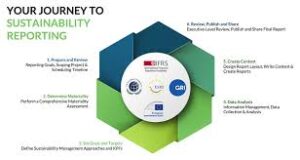Introduction
In today’s digital age, the collection, processing, and storage of data is central to the success of any business. This is especially true for sustainability reporting, where companies are increasingly relying on digital tools to gather, manage, and report their environmental, social, and governance (ESG) data. Sustainability reporting platforms are vital in this context, helping businesses track their sustainability performance and meet compliance requirements. However, with this growing reliance on digital platforms comes an increased responsibility to ensure data privacy and security.
As organizations incorporate more data into their sustainability efforts, they must address the privacy and security concerns surrounding the information they handle. This blog will explore the key data privacy and security considerations companies need to keep in mind when using a sustainability reporting platform.
The Importance of Data Privacy and Security in Sustainability Reporting
Sustainability data often includes sensitive information such as energy consumption, carbon emissions, water usage, employee working conditions, and social impact metrics. This information, when mishandled, could not only harm an organization’s reputation but also lead to legal issues and financial penalties.
For this reason, ensuring the protection of the data involved in sustainability reporting is essential. Failure to comply with privacy laws and security standards can lead to data breaches, unauthorized access, and misuse of sensitive data. Such breaches can be especially harmful when the data is shared with stakeholders such as investors, regulatory bodies, and the public, where trust and credibility are paramount.
Key Data Privacy Considerations in Sustainability Reporting Platforms
1. Data Collection and Consent
One of the first steps in ensuring data privacy in a sustainability reporting platform is ensuring that the data collection process is compliant with privacy laws. Businesses must ensure they obtain clear consent from all relevant parties before collecting personal or sensitive information. This is particularly true in regions with stringent data privacy regulations, such as the European Union’s General Data Protection Regulation (GDPR), which sets strict guidelines on data collection, processing, and storage.
When implementing a sustainability reporting platform, organizations should ensure that data collection policies are transparent and that they have obtained the necessary permissions. For example, if a company collects employee data for ESG reporting, it must inform employees about how their data will be used and give them the opportunity to opt-in.
2. Data Anonymization
In many cases, sustainability data does not need to include personally identifiable information (PII) to be useful. For example, reporting on carbon emissions, energy usage, or waste production can often be done without referencing specific individuals or confidential business data.
Anonymizing data can help mitigate the risk of exposing sensitive information, ensuring that businesses can continue to report on their sustainability performance while maintaining privacy standards. A sustainability reporting platform that offers robust anonymization features can make it easier to protect sensitive data while still meeting ESG reporting requirements.
3. Compliance with Data Privacy Regulations
With the increasing number of data privacy regulations worldwide, businesses must ensure that their sustainability reporting platform complies with applicable laws. These regulations include GDPR in Europe, the California Consumer Privacy Act (CCPA) in the United States, and the Personal Data Protection Act (PDPA) in countries like Singapore.
Each of these regulations has specific requirements for how data is collected, stored, and used. For instance, under GDPR, businesses must maintain records of their data processing activities, provide individuals with the right to access and delete their data, and ensure that data is only stored for as long as necessary.
To avoid compliance issues, organizations must ensure that the sustainability reporting platform they use has the necessary tools and features to comply with these laws. These tools could include data encryption, audit trails, and user access management, which help businesses meet the regulatory demands of their jurisdiction.
4. Data Encryption
Data encryption is a fundamental security measure that ensures sensitive information is protected during transmission and while stored in a database. Encryption transforms readable data into an unreadable format, which can only be accessed with the correct decryption key.
When using a sustainability reporting platform, it is crucial to ensure that all data—whether collected, transmitted, or stored—is encrypted. This helps to prevent unauthorized access, ensuring that even if a data breach occurs, the exposed information remains unreadable and useless to unauthorized parties.
5. Access Control and User Authentication
Access control is another critical security consideration when using a sustainability reporting platform. Only authorized individuals should be allowed to access sensitive sustainability data. This includes limiting access to specific data based on the role and responsibility of the user. For instance, a senior executive might have full access to all sustainability metrics, while a department manager might only need access to data relevant to their team’s performance.
Implementing role-based access control (RBAC) within the platform helps ensure that sensitive data is only accessible to those who need it. Additionally, multi-factor authentication (MFA) can be implemented to further secure access to the platform by requiring multiple forms of identification before granting access.
6. Data Storage and Retention
Data retention policies are crucial for ensuring that businesses do not retain sensitive data longer than necessary. Many regulations, such as GDPR, require organizations to only store personal data for as long as it is needed to fulfill its purpose. This means businesses must establish clear data retention policies, specifying how long sustainability data is stored and when it should be deleted or anonymized.
A sustainability reporting platform should offer features that help businesses manage the lifecycle of their data, ensuring that unnecessary or outdated data is automatically deleted or archived. This not only helps businesses comply with data privacy regulations but also reduces the risk of data exposure by minimizing the amount of information stored.
7. Third-Party Data Sharing
Many sustainability reporting platforms allow businesses to share their ESG data with third parties such as regulatory bodies, investors, and external auditors. This sharing of data can present privacy and security risks if the third party does not have adequate protection measures in place.
Before sharing any sustainability data, organizations must assess the security practices of third parties and ensure that any data shared is encrypted and protected. Additionally, businesses should ensure that third-party data processors comply with relevant data privacy regulations.
Conclusion
As sustainability reporting becomes an increasingly important part of business operations, protecting the privacy and security of the data used is paramount. By implementing robust data privacy and security measures, businesses can ensure that their sustainability reporting platform is not only effective in helping them track and report on their ESG performance but also compliant with global data privacy laws.
From obtaining consent for data collection to implementing encryption and ensuring third-party security, there are several factors that businesses must consider when using a sustainability reporting platform. By prioritizing data privacy and security, organizations can safeguard their reputation, maintain stakeholder trust, and avoid costly regulatory penalties.





